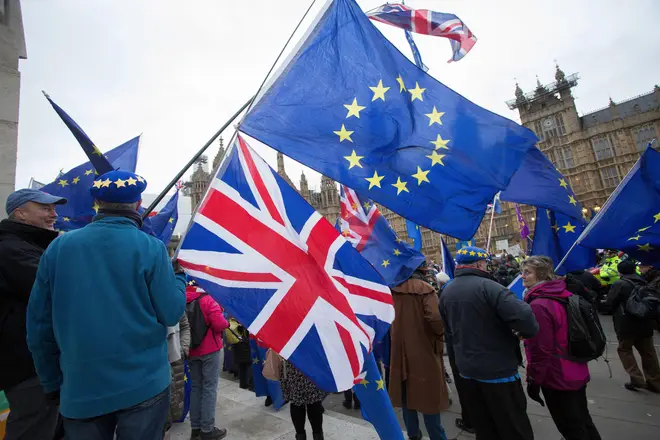
Iain Dale 7pm - 10pm
14 February 2024, 12:50 | Updated: 14 February 2024, 13:52

The UK has "significantly underperformed" compared to the European Union and the US since the referendum in 2016, new Goldman Sachs analysis shows.
The economy is thought to be 5% smaller than it would have been had it remained in the bloc.
It has been hit by trade in goods, lower business investment and a rise in non-EU migrants who are coming to study, not work.
Goldman Sachs said "the UK has significantly underperformed other advanced economies since the 2016 EU referendum, with lower growth and higher inflation".
Read more: Kemi Badenoch launches bid for three new mini US trade deals in Brexit pre-election boost
Consumer prices have risen by 31%, compared to 24% in the Eurozone and 27% in the US, due to increased friction in trade.
And with the vote having been driven hugely by a desire to regain control over migration, Goldman Sachs' analysis shows lower numbers of arrivals from the EU has added to tightness in the labour market, contributing to "the UK's higher inflation rates since 2016".

James O'Brien on Brexit
Investment trends could reverse after weakening from 2016.
That weakness has been put down to uncertainty about how Brexit would pan out, and could reverse now it has been mostly resolved.
This would be "consistent with stronger investment in recent quarters".
Read more: Tory candidate claimed £1,000 of Brexit cash to her own physiotherapy firm
Four years on from Brexit and the country remains divided on EU and Single Market membership.
YouGov data from January showed 51% of Brits would back rejoining the bloc, while a third would oppose reversing the referendum result.

Sangita Myska reveals her experiences in the countryside changed around Brexit
A total of 42% would accept joining the Single Market, instead of fully rejoining the EU.
It follows years of economic turbulence outside of Britain's membership of the bloc, with the pandemic and post-lockdown re-openings triggering inflation along with the effects of Russia's full scale invasion of Ukraine.
Figures on Wednesday showed inflation was still at 4% - defying predictions of a rise.
The government pledged to halve inflation in 2023, with it peaking at 11.1% in October 2022.
The Bank of England is aiming to bring it down to 2%, which chancellor Jeremy Hunt said is forecast to happen later in the year.